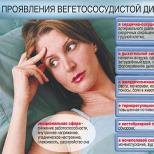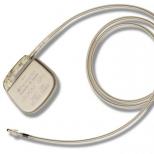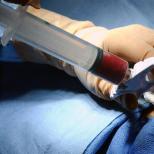Psychotherapy for VSD
For decades, psychotherapy has been actively used in VVD. The advice of a psychologist helps to cope with unpleasant symptoms, makes it possible to understand internal problems and complexes. Vegetative-vascular dystonia is losing ground with the right treatment method, even without medication.
Etiology and pathogenesis of the problem
Vegetative-vascular dystonia is associated with malfunctions in the autonomic system. The main symptoms include asthenia, dizziness and other life-spoiling symptoms. Modern medicine does not recognize VVD as a disease, and this disease cannot be found in the official list of diseases of the WHO. It is believed that such a disorder is the result of stress, emotional upheaval, overstrain, so it is recommended to start treatment with the help of a psychotherapist or psychologist.
Enter your pressure
Move the sliders
Symptoms of VVD are diagnosed in 80% of the inhabitants of the planet. In most cases, a person simply does not notice attacks of the disease, since a stimulus is needed to exacerbate the disease: heavy physical exertion, stress, lack of sleep, depression, etc. The first attack is so unexpected for a person that it is remembered for a lifetime. Doctors call this condition. It is accompanied by:
- tachycardia;
- pressure surges;
- fading of the heart;
- lump in throat;
- panic fear;
- cold sweat;
- disturbances in the rhythm of breathing.
 Psychotherapy, physiotherapy exercises and medical preparations are effective in the treatment of VVD.
Psychotherapy, physiotherapy exercises and medical preparations are effective in the treatment of VVD. Psychologist, neurologist and psychotherapist are the main specialists in VVD. The main goal of treatment is to restore the balance of a person’s mental strength, to normalize the mental balance of a person. The psychiatrist looks for the cause of a person's complexes and fears, and teaches him to live with them, manage and direct them in the right direction. A person learns to relax with the help of special techniques, breathing exercises. Also effective is the use of physiotherapy exercises, massages.
Do not ignore psychological help. For decades, it was believed that mental disorders were a whim. A competent specialist will help you deal with VVD, deal with fears, conflicts, teach you to understand your reactions, manage them. In the early stages of the disease, these skills cure most of the symptoms.
What to do during an attack?
Regardless of the severity of the attack, a person should always remember that this disease does not pose a danger to life, so you should learn to perceive it as calmly as possible. If the disease is approaching, the person is able to diagnose its symptoms, and over time can learn to ignore the attack and switch attention. Rules of conduct during an attack:
- Provide access to fresh air, open a window, unbutton the top buttons on a shirt or dress.
- Lie down, but at the same time the head should be lower than the legs for blood flow to the brain. If this does not work, you need to put your feet in warm water (only if the patient does not suffer from varicose veins), cover yourself with a blanket.
- Take a sedative on herbs ("Novopassit", "Valerian", "Valocordin"). If it does not help, you can take half a Phenozepam tablet.
Even if it is very difficult and scary, you should not abuse nootropic or antipsychotic drugs, as they worsen the course of the disease.
What is prohibited in VSD?
 An overdose of sedative drugs in the presence of a disease is dangerous to the patient's health.
An overdose of sedative drugs in the presence of a disease is dangerous to the patient's health. Certain activities and actions are strictly prohibited for people suffering from vegetative-vascular dystonia:
- sedentary, inactive life;
- the use of caffeinated drinks (energy, tea, coffee);
- excessive intake of B vitamins;
- extreme sports;
- drinking alcohol, smoking;
- watching thrillers, horror films, melodramatic programs - any content that causes negative emotions;
- abuse of sedatives;
- fear of approaching another attack;
- long work at the computer.
It is not recommended to eat foods that irritate nerve cells. If a large crowd of people causes panic attacks, it is better to avoid the crowd, but you do not need to refuse human society - this will aggravate the painful condition. Avoid sunbathing a lot and, if possible, avoid using public transport during rush hour. The best way to treat VVD is psychotherapy, fresh air, restful sleep and a practiced skill to cope with your fears.





